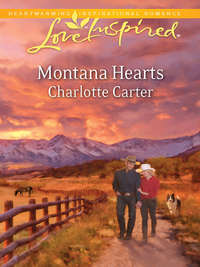
Полная версия
Home to Montana

Where The Heart Leads
Staying in one place was never Nick Carbini’s plan. When his troubled past leads him to Bear Lake, Montana, single mom Alisa Machak makes him consider putting down roots. Alisa doesn’t have a problem letting Nick work in her diner, but when he starts edging his way into her heart, she has to draw the line. He reminds her too much of her son’s father, another drifter who abandoned them both. Nick wishes he could be there for them, but believes he’s not fit to be a husband. When his worst fears come true one night, it’s up to Alisa to show him the perfect recipe for a forever romance.
Two weeks. Could he hang on for that long?
He wasn’t sure. He was about to say No, thanks when the image of Alisa popped into his head. The thought that she might give him an honest smile, more than her overly practiced, the-customer-is-right smile, gave him a jolt. He had no business thinking about that. Or wanting it.
He was definitely tired of being on the road. A clean room with a shower and free meals had a certain appeal.
Foolishly, he knew the real appeal was Alisa. He doubted she’d feel the same about him. Not if she knew the truth about how he’d spent the past three years. He didn’t have to feel pressured to stay.
Slowly he stood. “Okay, I’ll take your job.”
CHARLOTTE CARTER
A multipublished author of more than fifty romances, cozy mysteries and inspirational titles, Charlotte Carter lives in Southern California with her husband of forty-nine years and their cat, Mittens. They have two married daughters and five grandchildren. When she’s not writing, Charlotte does a little stand-up comedy, “G-Rated Humor for Grownups,” and teaches workshops on the craft of writing.
Home to Montana
Charlotte Carter

www.millsandboon.co.uk
Many nations will come and say,
Come, let us go up to the mountain of the Lord, to the temple of the God of Jacob. The law will go out from Zion, the word of the Lord from Jerusalem.
He will judge between many peoples and will settle disputes for strong nations far and wide.
They will beat their swords into plowshares and their spears into pruning hooks. Nation will not take up sword against nation, nor will they train for war anymore. Everyone will sit under their own vine and under their own fig tree, and no one will make them afraid, for the Lord Almighty has spoken.
—Micah 4:2–4
To all the men and women in uniform
who so bravely serve our country around the world, and to those who wait for them at home,
you have our heartfelt thanks.
Special thanks to Kara Lennox and Mindy Neff; you always make my books better.
Contents
Chapter One
Chapter Two
Chapter Three
Chapter Four
Chapter Five
Chapter Six
Chapter Seven
Chapter Eight
Chapter Nine
Chapter Ten
Chapter Eleven
Chapter Twelve
Chapter Thirteen
Chapter Fourteen
Chapter Fifteen
Chapter Sixteen
Chapter Seventeen
Chapter Eighteen
Epilogue
Dear Reader
Questions for Discussion
Excerpt
Chapter One
“A pretty lady like you shouldn’t have to chop your own firewood.”
Alisa Machak nearly sliced off her foot with the ax. She whirled toward the sound of the deep masculine voice.
The stranger stood in a column of sunlight that slid between the pine trees, highlighting his unkempt ebony hair, a matching beard and his equally disreputable dog sitting beside him. He wore old jeans and a khaki jacket that looked like it had come from an Army surplus store years ago.
A ripple of recognition stole through her, and a shiver raised the hair at her nape. A drifter.
Drifters passed through the town of Bear Lake, Montana, on a regular basis, some heading to Glacier National Park up Highway 93. Some with no particular destination in mind. None stayed long. She’d learned that lesson ten years ago, a painful lesson she would not soon forget.
Flashing him the friendly smile she used with strangers, she hefted the ax. “Someone has to make kindling for the fire.” She and her mother owned the Pine Tree Diner and the adjacent Pine Tree Inn. Unfortunately, their handyman, Jake Domino, had gone to stay with his daughter while she recovered from an auto accident. He’d be away at least a couple of weeks. So Alisa was chopping wood, among other chores that had to be done.
The stranger strolled toward her, all long legs and a gait that seemed a little uneven. “I’m pretty good with an ax. I’d be glad to help out. You wouldn’t have to pay me.”
She cocked her head in disbelief. This guy was a drifter with a silver tongue, the kind of man who Alisa had learned to keep at a distance while doing her smiling welcome-to-Pine-Tree-Diner shtick.
“If the diner has some scraps for Rags, I’d appreciate that.” His baritone voice sounded as smooth and rich as homemade gravy.
That stopped her. “Rags?”
“My dog.” He patted his thigh. The dog stood looking up at him waiting for his next command. “I figured when I found him that he looked like the old rag bag my mother used to have. She used the rags for cleaning and scrubbing the house.”
“You found the dog?” She’d heard that some pickup artists used a dog to put a woman at ease and get her off guard. Vulnerable. But surely a man like that wouldn’t go out of his way to look so scruffy. Maybe his angle was playing for sympathy. She wasn’t going to bite on that gimmick either.
“Found him a week or so ago. I pulled into a rest area to sleep. In Colorado, I think. Nobody else was around except Rags. No tags on him. No collar. And he was pretty hungry.” Casually, he patted the dog’s rough, ragamuffin coat colored in shades of wheat and tan. Floppy ears hung down on either side of an imposing head. “Guess you could say we sort of adopted each other.”
He’d evidently been on the road a while. Just drifting, Alisa gathered. She supposed she ought to give him credit for taking care of a stray dog. The affection between the two seemed genuine. Two lost souls? Maybe. Or maybe not. Not that it was any of her business.
She looked toward the back of the diner, a building three stories tall, painted a bright pink, with family living quarters in the top two floors. Planter boxes filled with pots of colorful geraniums were placed in front of the second floor windows.
They’d have a big crowd tonight at the diner for their Thursday night special. Alisa had plenty of work to do inside, setting up for the evening while her mother, who everyone called Mama, handled the kitchen preparations. She really didn’t have time to chop kindling for the big fire pit in the outdoor patio. September evenings had begun to turn cool.
She swung the ax, imbedding the blade in the chopping stump.
“Okay, mister...?”
“Nick. Nick Carbini.”
“You’ve got yourself a deal, Nick. I’m Alisa Machak, half owner of the diner and motel next door. You make us a big pile of kindling, and I’ll make sure your dog gets the best scraps in the county.”
His dark beard shifted as he smiled, revealing a row of perfect white teeth. She noticed he had incredibly blue eyes, the color of the sky on a clear winter day. Squint lines fanned out at the corners.
Yet she also saw a hint of sadness in those clear eyes. A shadow of loneliness she sometimes saw in her own mirror and had learned to ignore.
She forced down her curiosity about where he had come from and why he had no place to go. That was none of her business either. From her perspective, he was simply another tourist passing through town.
“When you’re done, stack the kindling under the lean-to by the kitchen. There’s a wheelbarrow you can use.” She gestured vaguely toward the woodpile.
“No problem. I’ve got it covered.”
Based on his over six-foot height and the breadth of his shoulders, he’d be able to turn a whole cord of wood into kindling without breaking a sweat. At least that would save her from developing calluses on her palms for one day.
She turned, her steps light as she walked back to the kitchen entrance, her senses vividly aware of the chunk, chunk of the ax on a pine log. Aware of the stranger’s strength. The power of his arms. His tempting smile.
And determined not to acknowledge how thoroughly he’d stirred memories she’d rather forget.
In the kitchen, three big pots of water steamed on the stove ready for Mama to drop in the loaves of bread dumplings for tonight’s paprika chicken house special. A recipe Mama had learned from her own mother in Czechoslovakia.
Meanwhile, Hector Gomez, their short-order cook and kitchen helper was serving up buffalo burgers and fries and cold sandwiches for the midafternoon crowd.
The scent of baking bread, grilled meat and aromatic spices were as familiar to Alisa as a mother’s perfume. She’d grown up here in the kitchen. First in a playpen safely away from spattering grease and well out from under the hurrying feet of the waitstaff. Later, standing on a chair so she could reach the prep tables, she’d rolled dough for biscuits and grated potatoes for potato pancakes, another Czech specialty. Served with apple sauce or sour cream, they had been a staple in Alisa’s life.
Her father had done most of the cooking when Alisa was young while Mama worked the front of the diner. But he had passed away ten years ago, leaving Mama and Alisa to manage the diner.
This was her home, the place that held her heart and consumed the vast majority of her waking hours. The regular customers she served were her extended family. Old-timers who had lived here most of their lives. New folks who had more recently found a home under the wide Montana sky.
Mama turned and smiled. Her once blond hair was dulled now by streaks of gray. Her perpetual smile had formed permanent parentheses around her mouth.
“You finished making kindling already?”
Alisa shrugged out of her jacket and hung it on a coatrack near the door. “Nope. A drifter came by and offered to do it for me. All he asked in return was some scraps for his rather shaggy-looking dog.”
“What? You didn’t offer him a few dollars? A little supper?”
“He didn’t ask.” Everyone in town knew Mama was a soft touch, although the locals rarely took advantage of her. Drifters weren’t always so thoughtful. “I imagine he’ll be hungry by the time he’s through.”
She washed up in a nearby sink, tied her hair back and went out front to see that they were ready for the evening rush.
* * *
Nick split another log, gratified by the growing pile of kindling by the stump. It felt good to use his muscles. He’d been cooped up in his pickup for too long. Driving and sleeping under the camper shell whenever and wherever he stopped.
Maybe he’d stay a few days in Bear Lake, camp somewhere nearby, hike the trails through the forest, check out the house where he’d been born. The house where his mother had died some twenty years ago.
His throat tightened on the memory of his mother so sick she couldn’t get out of bed. So pale it was like all of the blood had been sucked out of her. He’d only been ten years old when the ambulance came to take her away forever.
Not long after that his dad had piled their few possessions in his old, beat-up truck. They’d gone east and south, moving a dozen times whenever his dad lost his job or got restless. Finally, when Nick had managed to get a high school diploma he’d bailed on his father and joined the army.
He’d been out now for nearly four years.
A couple of weeks ago he’d tried to reconnect with his dad. His father had tossed him out of his house in Baton Rouge, or more accurately his dad’s current girlfriend had insisted he leave. She didn’t want an ex-con living in her house. Nick’s old man hadn’t ever been much of a father so he sided with the girlfriend, who doubled as his drinking buddy and sometimes, Nick suspected, his punching bag.
Nick hadn’t had a destination in mind when he left Baton Rouge. He’d simply gotten in his truck and headed north.
But the farther north he drove, the more the thought of Bear Lake drew him. He couldn’t tell if it was God who was leading him or his own childhood memories of home. Maybe both.
He swung the ax again. Two pieces of kindling jumped from the stump onto the ground. He paused long enough to take off his jacket and look around. Sweat edged down his spine.
Nice layout Ms. Alisa Machak had here. A good business. Even in the middle of the afternoon there were a fair number of cars parked out front. He hadn’t lied about her being a pretty lady, either. Hair a honey blond that skimmed her shoulders. Shoulders much too slender to wield an ax with so much strength. Or maybe she was working on a heap of determination more than sheer muscle power.
Nice eyes, too. A dark blue like the deepest part of a lake. But she hadn’t smiled much, not at him. He didn’t blame her for that. He must look pretty rough after a couple of weeks on the road.
Rags came trotting back from wherever he’d been with a stick in his mouth.
“You’d better stay close by, buddy. If you hang around, you’re gonna get some really tasty scraps. That pretty lady promised you’d get the best in the county.”
Tilting his head, Rags looked up at Nick with his big, brown eyes and whined. Trying to sucker Nick into throwing the stick.
“No, I can’t play now. Gotta turn all this split wood into kindling. Maybe later, huh?”
Nick hung his jacket over a tree limb and got back to work. Three more whacks, and another split log became kindling.
“Hey, mister. Is that your dog?”
Rags stood and stretched, the branch still in his mouth.
Nick rested the ax head on the stump. A blond kid with a head full of cowlicks and a backpack slung over his shoulder stood a few feet from him. He looked to be about nine or ten.
“Mine ’til he decides otherwise,” Nick said.
“Is he friendly?”
“Friendly enough. You want to pet him?”
The boy ditched his backpack on the ground and rushed forward, dropping to his knees. “Does he have a name?”
“I call him Rags.”
“Hiya, Rags.” Cautiously, he petted the dog’s neck and back.
Rags’s tail began an upbeat tempo that wobbled his whole rear end.
“Does he like to play fetch?”
“Give it try. See what happens.” Nick knew from experience that Rags could wear out a man’s arm before he’d quit fetching any old stick.
He watched with amusement as the boy gently took the branch from Rags. Alert, Rags was already into the game when the boy tossed the stick a few feet away. Rags had it back to the youngster in milliseconds and lay down waiting for the next go around. His tail semaphored his readiness.
“You might want to toss it a little farther,” Nick suggested mildly.
The youngster shot it toward a wooded area, and soon boy and dog were running around full blast. Laughter and barking filled the clearing where Nick wrestled split logs onto the stump.
In that moment, an emotion so powerful he almost dropped the ax rose up in Nick. A sensation of loneliness so stark and desperate he had to close his eyes. He wanted to run away. To forget the past. Start over.
But that wasn’t possible.
* * *
Alisa heard the ruckus outside and stepped to the kitchen door. Her breath caught in her lungs when she saw her son playing with the stranger’s dog.
No! Don’t get attached to the dog. The drifter will take him away. That’s what drifters do. They leave.
“Greg! It’s time to come in.” Panic raised her voice to a shrill note.
“But Mom, I’m playing with Rags now.”
“Now, Greg. Come get a snack and start your homework.”
“Just two more minutes.”
Alisa took a step out onto the porch toward her son, planted her fists on her hips. “One, two...”
Greg’s shoulders slumped. He tossed the stick he’d been playing with aside and trudged toward the house while the dog looked on with the stick once again in his mouth.
Her heart broke for her little boy, but in this case she knew she was right. She had to protect her son from smooth talking men who broke promises and left plenty of heartache behind.
She only wished she’d known that ten years ago.
After Greg washed up, Alisa shooed him over to the last stool at the counter out front in the diner. She brought him a bowl of fresh-picked wild blackberries and a slice of toast spread with peanut butter.
“How was school today?”
“Okay, I guess.”
“Anything exciting happen?”
“Pete Muldoon had to go to the principal’s office again.”
“Why this time?” Poor little Pete seemed to be perpetually in trouble.
Greg took a big bite of toast, chewing while he spoke. “We were playing tag at recess. He was it and followed Tammy into the girls bathroom to catch her.”
Alisa suppressed a grin. “Oh, dear.”
“Tammy wasn’t mad or anything. I think she likes Pete.”
But maybe not so much in the restroom. “You do your homework after you finish your snack. If you need help, let me know.”
“’Kay.” He spooned a blackberry into his mouth. Juice dribbled out around the corners. “Mom, could we maybe have a dog someday?”
She and her son had had this conversation any number of times. “I can’t have a dog inside the diner, honey. You know that. And there are too many wild animals around to leave a dog outside all the time.”
“We could keep him upstairs with us.”
Reaching across the table, she pulled her son’s head toward her, kissing him on the crown. “Sorry, munchkin. No dogs for us.”
Dogs were for families with a mother and father and two-point-five children who lived in houses with white picket fences. Not for single moms who worked double shifts and often smelled like grilled hamburger meat at the end of the day.
* * *
Nick stacked the last of the kindling under the lean-to and grabbed his jacket.
“Come on, Rags. Let’s see what kind of table scraps Ms. Alisa has come up with.” Maybe there’d be a few scraps suitable for a hungry man too, he mused, his stomach growling.
He knocked once on the kitchen door but stopped when he heard a woman inside yelling. Not Alisa’s voice. Someone older. And far angrier.
“What you mean, you can’t come ’til tomorrow? We got two hundred people coming tonight. I’m not going to—” After a moment of silence, the woman ran off a string of words that Nick couldn’t understand but guessed were an expression of her frustration.
He took a step back from the kitchen door. “I think we ought to wait a while for those scraps, buddy.” But before he could get away, the door flew open.
An older woman, her cheeks flushed with anger appeared, her eyes burning with fury. “What do you want?”
“It’s okay, ma’am. Just wanted you to know the kindling—”
“You know anything about fixing a dishwasher?”
The abrupt question stopped him. He blinked. Beyond the woman he could see the shine of stainless steel prep tables and refrigerators. He caught the scent of garlic, onions and paprika. Heard the clatter of pans and sizzle of meat on a grill.
Sweat formed on his brow and dripped down his neck. His breathing became labored.
Automatically, he dug his hand into his pocket and began to rhythmically squeeze the rubber ball the prison chaplain had given him. It was supposed to relax and distract him. Don’t lose it. There’s nothing to be afraid of. Think of something else. They’re only memories. It isn’t happening now.
“Mister, I’ve got a busted dishwasher that’s full of dirty dishes. If I don’t get it fixed in a hurry, we’re going to be hand washing every single dish in the place. Now...” She put her fist on her hip in much the same way as Alisa had earlier. “You know anything about fixing machines or don’t you?”
“I, ah...” He did have some idea. And he sympathized with the woman’s problem. But fixing the dishwasher would mean going inside the kitchen. Being surrounded by reflections that flashed and sparked off the stainless steel equipment, bringing back memories he struggled to forget. Images he couldn’t ignore. Afghanistan. An attack on his outpost. A shiny kitchen turned into a bloodbath. His crew dead or dying.
He clenched his teeth. Squeezed the ball harder. Don’t think about it.
Alisa, the blonde who’d been chopping kindling slipped up behind the older woman. “What’s going on, Mama?”
“The dishwasher is busted. I called Samson. He can’t come ’til tomorrow.”
A frown etched Alisa’s forehead, matching her mother’s. “Guess we’ll just have to make-do somehow.”
Helplessly, Mama threw up her hands. “It must be God’s will.”
“I can try to fix it.” Nick didn’t know why he’d spoken. Maybe it was the mention of God. Or the thought that the Lord had brought him here for a reason. To fix a dishwasher? He nearly choked on how ridiculous that sounded.
Mother and daughter both gaped at him.
“You know how to fix a dishwasher?” Doubt deepened the grooves in Alisa’s forehead.
“I’ve fixed a few. No guarantees.”
“Come on inside, young man.” Mama opened the door wider. “Give it a try. We’ve got nothing to lose.”
He signaled Rags to stay. Using every ounce of courage he had, Nick crossed the threshold into the shining bright world of a commercial kitchen.
Blackness oozed in around the corners of his mind. The scream of bullets and crying men assaulted his ears. He fought to keep them at bay.
This was the world that had once been his to command. A place where he’d felt at home as the top chef.
After Afghanistan, would that ever be true again?
Chapter Two
Nick gritted his teeth.
He could do this. All he had to do was keep focused on the present. The mission. Find the dishwasher. Figure out what was wrong. And fix it. Plus keep his eyes averted from shiny surfaces that inevitably awakened horrific memories.
He forced himself to remember his mother’s kitchen. The smell of oregano and tomato sauce simmering on the stove. The laughter they’d shared when she taught him how to make fresh pasta. The good times before she got sick.
Alisa’s mother marched ahead of him. He watched her feet, her black leather granny shoes treading on the spotless, blue-gray, antiskid tile floor. A well-kept kitchen. A-rated and ready to pass muster with the toughest health inspector.
She stopped so abruptly, Nick almost ran into her.
“This is the creature that has decided to plague me.” She slapped her palm on the side of the upright stainless steel dishwasher. Clearly an older model, probably prone to problems.
Nick used the sleeve of his jacket to wipe the sweat from his brow and squinted to minimize reflections. “What’s wrong with it?”
“She won’t start. Hector, he pushes the button. Nothing happens.” She thumbed toward the fry cook working at his station, a small guy who looked young enough to be a new enlistee. “I push the button. Nothing happens.” The rhythm of her voice spoke of foreign roots.
The washer not starting meant the problem could be anything from being unplugged to a motor that had burned out.
Frowning, he looked along the back of the machine. “Do you have a flashlight?”
Almost instantly, Alisa thrust a heavy-duty flashlight toward him. “Here. I thought you might need one. We lose power pretty often in the winter so we’ve got these positioned all around the diner. Summer lightning storms can knock out the power too.”








